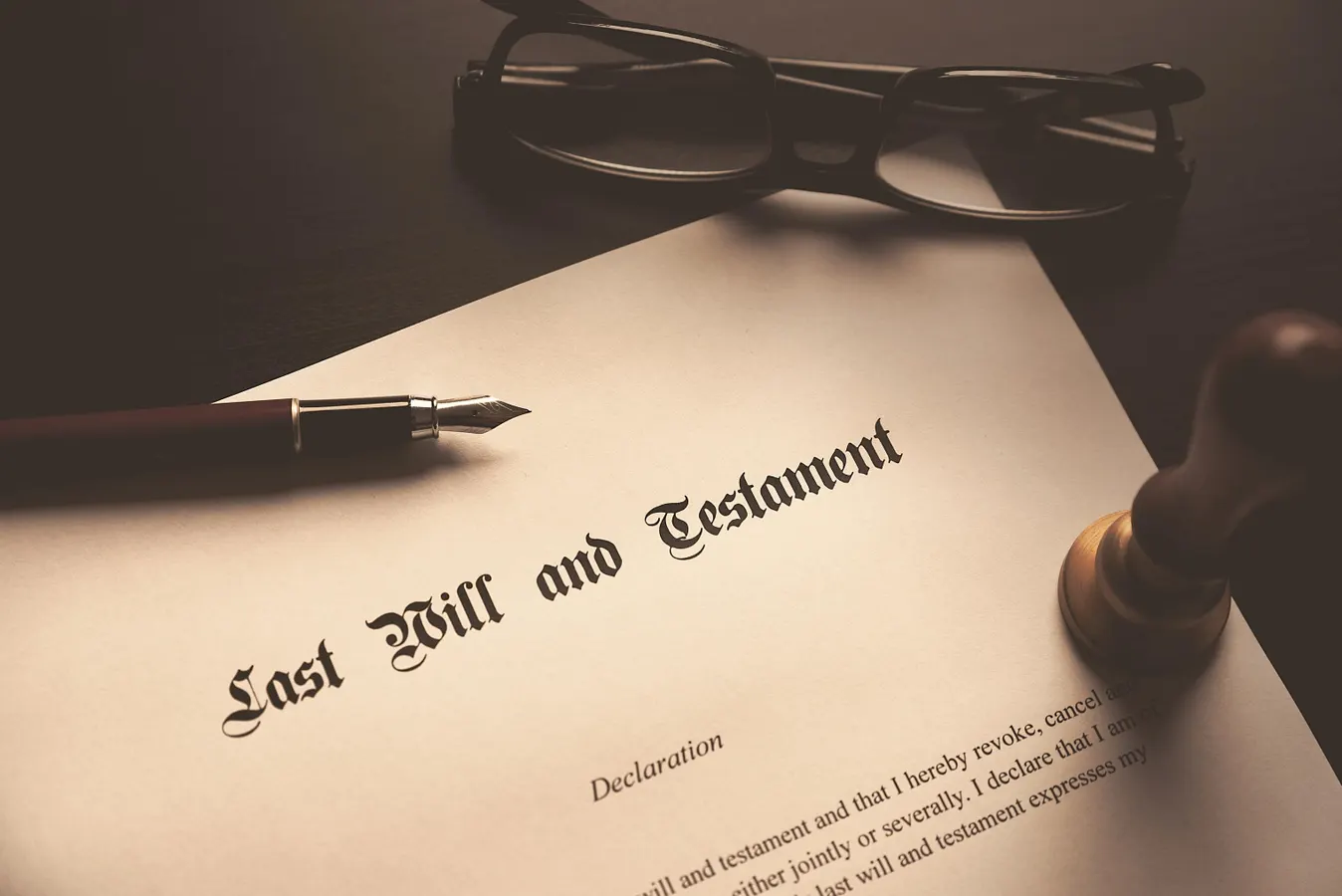
Wills
A ‘Will’ or ‘testament’ is a legal document that expresses a person’s (‘testator’) wishes as to how their property (estate) is to be distributed after their death and as to which person (‘executor’) is to manage the property until its final distribution. Some Frequently Asked Questions about a Will are placed below and some specimen will templates may be seen here.
When should one make a will?
- It is never too early to execute a Will and every one is advised to do so at the earliest.
- When an individual gets married/ remarried he should consider executing a Will in favor of his wife.
- No one should be compelled to make a Will if for any reason, he is not inclined to do so.
Why should one make a will?
- On the death of an individual, if no Will is made i.e., he or she dies intestate, then his / her assets are equally distributed amongst his/ her heirs. In such a case his / her spouse or unmarried children or an ailing relative is likely to suffer unintended financial loss.
- Nominees are normally made out for Bank Accounts / Deposits, Investments, Provident Fund, Gratuity, LIC claims, etc. However, the nominated person is entitled to receive the amount only as a temporary custodian on behalf of the rightful heirs, who will either be indicated either in the Will or – if the deceased dies intestate – then will be decided as per the relevant Succession Act (such as the Hindu Succession Act 1956).
- A house or other immovable property, even if held in joint name by the intended beneficiary, can be claimed by other heirs unless it is specifically mentioned in the Will.
- Even if there is only one heir and no Will is made, other relatives can stake a claim on the properties by taking advantage of the provisions of law. In some cases, even the sole heir is called upon to prove his or her bonafides in the court of law.
- More often than not, the Will is the only tool to ensure proper and dignified treatment in old age.
- There are many occasions in one’s life when one feels highly obliged towards someone in particular or feels like giving a helping hand to an individual or social organisation or a religious cause. One of the best ways to give expression to this feeling is to bequeath a suitable asset to such person / organisation through the medium of the Will.
- On occasions, if all the individual’s offspring are not having the same financial status, a suitable balance can be sought through the medium of the Will. Adequate provision can even be made for a disabled child through the ‘Will.’
- Every lady can and should make a suitable Will in respect of her possessions as per her desire. In particular, the ornaments and other household items are considered as Stree Dhan or the lady’s wealth, which she is free to dispose of as per her wishes.
- To sum up, making a Will is amongst the foremost best practices that a veteran should follow.
Requirements of Wills
- A Will should be clear-cut, unambiguous and precise.
- A Will should not have been made under duress.
- No stamp paper or stamp duty is required to make a will. The Will can be made out on blank paper.
- The existence of pin holes in a Will may give rise to an inference that some documents were attached to the Will and thus may create difficulties at the time of probate. Hence, using pins on the Will to keep pages together must be avoided.
- It is advisable to consult a lawyer when drafting the Will, especially if the testator has diverse assets which are being bequeathed amongst several heirs, to ensure that it is will pass legal muster when produced in the Court for purposes of probate.
- The Will can be either handwritten in the testator’s own handwriting (holographic will) or typed and signed. Overwriting and corrections should be avoided, but if made, the testator must put his full signature next to each of them.
- If the person making the Will is sick, the same should be signed in the presence of a certified Doctor. A suitable certificate from the doctor, stating that the testator was in full control of his faculties and capable of conscientious thinking while signing the Will, should be endorsed on the Will.
- The signing of the Will should be witnessed by at least two individuals, who should record their names and addresses and sign against each. The witnesses, as far as possible, should be younger than the person making the Will and should not be beneficiaries of the Will itself.
- It is not compulsory to register the Will. There is, however, a provision for registration of the Will either by the Testator or by the Executor, for which there is no time restriction. Registering the Will means that it is considered authentic and, if the original is lost, then a certified copy of the same can be obtained from the Registration Office (this is not, however, a substitute for a Probate). Another advantage is that those seeking transmission of assets of the deceased will not have to obtain ‘No Objection Certificates’ from other legal heirs. A sealed envelope containing a copy of the Will is to be handed over to the Registration Office for safe custody. On demand of a copy, the envelope is opened and the Will is first copied in the register. A copy of this document, duly certified, is then handed over.
- The Will can be changed or modified by the testator at any time. However, if a new Will is made or a correction slip (called a Codicil) is attached, all the formalities mentioned above must be gone through again. In the case of a new Will, it should be clearly stated that, “This Will supersedes the earlier Will made by me on – (date).” In the absence of such a clause, the new Will may be considered as null and void.
- To ensure that the testator’s wishes indicated in the Will are faithfully carried out, a person should be nominated in the Will as the Executor of the Will. The Executor can be a beneficiary of the Will.
What can be ‘Willed’?
- All the properties acquired from an individual’s own earnings e.g salary, business proceeds, investments, shares, provident fund, gratuity, LIC claims, etc qualify for disposal in his / her Will, and the same cannot be challenged by the heirs.
- As per Hindu law, a Hindu lady is the bonafide owner of the immovable property in her name, in addition to all the ornaments and household goods received by her from her parents, her husband, her in-laws, etc and she is free to dispose off the same as per her own desire.
- An individual generally Wills his possessions to his or her spouse and offspring. Properties gained through hereditary laws are liable for equal distribution to the direct heirs. It is preferable to mention details of such properties as well as the direct heirs in ones Will.
- When a self acquired property is held in joint name, the portion of the property owned by an individual can be disposed off through the Will.
- It is appropriate to attach a detailed list of all the testator’s assets, with the Will. It is inevitable that such a list will undergo certain changes in course of time. A suitable mention of action to be taken in such an eventuality can be incorporated in the Will.
When can Wills be Declared as Void?
- If it is established that the Will itself or some portion of it has been written under duress.
- If there is overwriting and changes, which are not authenticated by the maker of the Will and the witness.
- If the Will is not duly signed by the witnesses.
- If the provisions made in the Will are impossible to comply with or not legal or are derogatory to social harmony.
What is a Probate and how does one obtain it?
- Probate means to determine judicially the validity of a Will and is granted by an appropriate Court when a Will exists. For this, the Executor of the Will must make an application to the Court of competent jurisdiction.
- In order to obtain Probate, there are two legal requirements.
- To establish that the Will in question had been made voluntarily and signed by the deceased Testator in the presence of independent witnesses.
- To ascertain that there was no subsequent Will executed by the deceased.
- To establish the first requirement, those who have signed as witnesses are required to appear in the civil court and give evidence to authenticate the Will in question. Once this is done, the court promulgates notice in Govt. Gazette and local newspapers, to whom it may concern, to produce before the court within the given period, any Will, if held by anyone claiming to be made by the so-named Testator. When the Will in question is not contested by any other member of the family, a Probate of Will is issued by the court.
- In case witnesses to the Will have predeceased or are not traceable, then the nominees have to obtain a succession certificate for claiming the estate of the deceased. If the Will is registered with the Registrar/Sub Registrar, it obviates the requirement of the presence of witnesses to appear before the Magistrate to authenticate the Will and obtaining of probate of Will is made easier.



